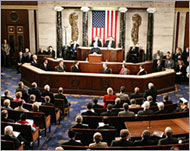Social spending hit in US budget
The US president has proposed to boost defence spending, slow Medicare’s growth and cut a host of domestic programmes in a $2.77 trillion budget that seeks to soothe Republican frustrations over high deficits.

George Bush wants to scale back or scrap 141 programmes – with education, cancer research and community policing programmes slated to take a hit – but he proposed a record $439.3 billion defence budget, up 4.8% from last year.
On top of that, the White House will seek new financing for wars in Iraq and Afghanistan.
With congressional elections in November, the fiscal 2007 blueprint announced on Monday came under swift attack from Democrats, who said that the elderly and working Americans would bear the brunt of Bush’s fiscal mismanagement.
The plan would cut discretionary programmes outside national security by 0.5%.
The president renewed his call for the Republican-led Congress to make his tax cuts permanent even as he projected a surge in the federal deficit to $423 billion this year, up more than $100 billion from the fiscal year 2005.
Bush said that failing to extend his tax cuts would amount to a tax increase.
Fiscal problems
But congressional Democrats said his plan masked the depth of fiscal problems by ignoring the long-term impact of the 2001 and 2003 tax cuts, which they said would cost $1.5 trillion in 2012-2016 if they are fully renewed.
Senator Kent Conrad of North Dakota, senior Democrat on the Senate Budget Committee, said: “The tax cuts explode after five years.”
Harry Reid of Nevada, the Senate Democratic leader, called the budget document “immoral and irresponsible”.
 |
|
Lawmakers will debate the |
“After creating record deficits and debt with his budget-busting tax breaks, the president is asking our seniors, our students, and our families to clean up his fiscal mess with painful cuts in health care and student aid,” Reid said.
Democrats hope to overturn Republican dominance in both chambers of Congress in the elections in November and see the deficits as an issue on which Bush and his allies are vulnerable.
The budget will be debated this spring and the eventual product could look very different from Bush’s plan.
The White House pencilled in $50 billion for war spending in 2007 but Joshua Bolten, the budget director, said that was simply based on Congress’s initial allowance for 2006 and was not a firm assessment of the needs.
“It’s very hard to say what we’ll be spending 18 months from now in Iraq,” Bolten said. “It has been a very expensive undertaking.”
A new infusion this year of $70 billion in emergency funds for the wars in Iraq and Afghanistan dwarfs the proposed domestic programme cuts in fiscal 2007 and is double the five-year savings of $36 billion in Medicare.
War spending
Total war spending for 2006 is $120 billion – the budget’s single biggest discretionary item. The $70 billion in emergency funds is in addition to $50 billion already approved by Congress.
|
“After creating record deficits and debt with his budget busting tax breaks, the president is asking our seniors, our students, and our families to clean up his fiscal mess with painful cuts in health care and student aid” |
Even though fiscal conservatives are upset about the deficits, politicians are usually squeamish about cutting programmes in an election year, making Bush’s wish list a tough sell.
Nine of the 15 cabinet agencies would suffer cuts, with education down 3.8%, justice 7.2% and transportation 9.4%. Veterans Affairs was given an 8% increase, one of the few domestic programmes to get a bigger budget.
Spending for the Iraq war and Hurricane Katrina have contributed to an expected rise in the 2007 deficit to $423 billion from $318 billion in 2006. But Bush still maintains that he can halve the shortfall by 2009.
A handful of domestic programmes would get fresh cash. Those include research and development, math and science education, high-tech training and alternative fuel sources.